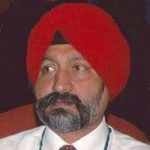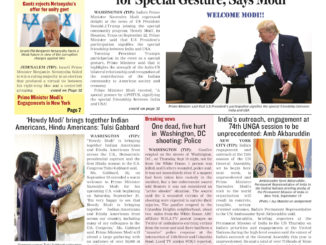
The first Webinar on Augmenting US-India Healthcare Relations under Covid Challenge organized on June 1
NEW YORK (TIP) :The first webinar on June 1 focused on augmenting US-India Healthcare Relations under Covid Challenge. The panelists included Ambassador Sandeep Chakravorty, Consul General of India at New York, Prof. T R Bhardwaj, Vice Chancellor, Baddi University, HP, India, Mr. Vivek Padgaonkar, Ex Director, Organization of Pharmaceutical Producers of India, Prof Saranjit Singh, Pharmaceutical Scientist, NIPER, India, Prof Kanwaljit Chopra, Chairperson, UIPS, PU, Prof Charles N Pozner, Head Emergency Medicine , Harvard University, Mr. Samrat Dani, Vice President, Fulton Bank, USA, Prof Pradeep Gupta, Burroughs Wellcome Professor of Pharmaceutics, Mr Roop Singh, Chief Business Officer, Birlasoft, USA, and Prof. Indrajit S Saluja, Publisher and chief editor The Indian Panorama.

Welcoming and introducing the panelists Mr. H.S. Panaser, Chair, Global Indian Trade and Culture, USA. Spoke on the need for a series of webinars to deal with the subject of cooperation between the U.S. and India in the pharmaceutical sector. He said, “The dependencies and inter-dependencies of globalization especially between US and India, have been in headlines during the COVID-19 pandemic—and nowhere more so than in the Healthcare segment. More so, in pharmaceutical industry.
Mr. Panaser spoke about the Indian pharmaceutical scene and the healthcare sector. “The Indian healthcare sector is expected to reach Rs 19,56,920 crore (US$ 280 billion) by 2020. Rising income level, greater health awareness, increased precedence of lifestyle diseases and improved access to insurance would be the key contributors to growth. Indian Pharmaceuticals is a sunrise industry with a competitive advantage for India globally. we should leverage India’s position by unleashing entrepreneur spirit the bullish outlook for health care segment is now taking India in a forward momentum. The market size of India in Pharmaceuticals alone is estimated to be $100 billion and medical devices is $25 billion by 2025. Now with amendment in FDI policy where one can invest up to 100% specially if it is medical devices segment where India is importing 80% of medical devices”, Mr. Panaser said.

Ambassador Sandeep Charkavorty, Consul General of India at New York who inaugurated the webinar series, said he was not aware there was to be a formal inauguration.
“I think webinar, zoom and WebEx conferencing are the new normal. It is high time that we start reconditioning our life to this new format . So I’m very happy to be here with such a distinguished panel. I will first like to congratulate our friend Harry Panaser for bringing up this panel of speakers .He has been working in the health care sector for several years now and he has deep knowledge and connections here in the United States and back home in India and it is not surprising that he has decided to hold a seminar on Indo US cooperation and collaboration in health care , particularly in the context of Covid challenge. To set the ball rolling, I am very happy to inaugurate this webinar”.

Mr. T Srinivas, the CFO of Bharat Biotech of Hyderabad, India which owns 160 global patents said, “Our products help people in over 65 countries live to their fullest potential. Our manufacturing facilities are approved by USFDA, KFDA and WHO. We have delivered over 3 billion vaccine doses all over the world.”
Mr. Srinivas said “We started working on Covid vaccine in March 2020. We are now working on animal trials in India.

Prof. T R Bhardwaj, Vice Chancellor, Baddi University, HP, India said it was a matter of pride that India has emerged as a global Pharmaceutical Competitor. One third of the world’s generic drugs and formulations as well as bulk drugs, and Active Pharmaceutical Ingredients (APIs) are manufactured in India. “You will be surprised to know that one third of India’s production is from Himachal Pradesh , mainly from Baddi area, in the neighborhood of Baddi University. Baddi is Asia’s largest industrial hub and is only 45 Km from Chandigarh”.
“India has always been considering profession of Pharmacy as service to the mankind. Dr Yusuf Hamied , CIPLA Limited, has already served the poor AIDS patients of Africa by providing Anti – AID medicines at the cheapest rates. The same service to the mankind has been further repeated by our PM to provide Hydroxychloroquine and other preventive drugs to US and other countries during Corona Pandemic.”
Prof Bhardwaj said “You will be pleased to know, it is a matter of pride for us, that Baddi University extended their hostels facility to the staff, working round the clock ,of all these manufacturing companies during Covid – 19 lockdown. Although at present we have around 75 FDA and almost 70 approved by regulatory agencies of other countries such as Australia, South Africa, Europe etc.”, said Prof Bhardawaj

Mr. Vivek Padgaonkar, Ex Director, Organization of Pharmaceutical Producers of India said:” India-US partnership has been consolidating over the years and COVID-19 pandemic has further bolstered Indo-US partnership through supply of HCQ and other APIs. While there has been a huge strain on the healthcare system due to outbreak of COVID-19 pandemic, pharmaceutical companies have an unprecedented opportunity to play a significant role in this fight against the virus. With every adversity comes a learning opportunity. Covid-19 has been no exception. One major takeaway has been the power of collaboration”.
“In the middle of this global crisis, Indian pharma has proven to be consistent and reliable. The biopharmaceutical industry generates significant economic value in terms of job creation, R&D investment, and medications that improve patient productivity. However, the first quarter of 2020 saw disruption of many industries’ supply. Currently, Indian pharmaceutical companies account for around 40 per cent of the generic drug supply to the US market.”
Vivek said “We can partner with innovators (e.g., Serum Institute of India with two companies on the vaccine for COVID-19; Gilead is partnering with many Indian companies on Remdesivir.”

Prof Saranjit Singh, Pharmaceutical Scientist, NIPER, India said “Covid pandemic has helped Indian Industry to regain the stature to certain extent. Over a 10-year period (2009-2018), the U.S. saved about two trillion dollars through generic drugs. Foremost is re-building faith in Quality of Indian Generic Drug Production. He emphasized the importance of National Institute of Pharmaceutical Education and research and the visionary who initiated the institute, Late Prof Emeritus Harkishan Singh. There is a need for impetus for industry to get above the basic GMP compliance to high-tech manufacturing, so that quality is built into the product, and not tested. The academia also needs to rise to occasion and shall collaborate for training of students in high-tech emerging areas with leading International institutions using e-modes. The country needs to establish Centre’s of Excellence (COE) in areas, like viral drug research, continuous manufacturing, etc. Innovation and deep scientific research have to be thrust areas for pharma institutions in future” quoted Prof. Singh.

Prof Kanwaljit Chopra, Chairperson, UIPS, PU, India emphasized the research at the university. She quoted a range of top CEOs and professionals in Academia, Government and Industry who are from Punjab University globally in Pharmaceuticals.

Prof. Charles N Pozner, Head Emergency Medicine , Harvard University, presented the video clipping on operations process of stimulation now reaching India.

Mr. Samrat Dani, Vice President, Fulton Bank, USA presented his experience of putting finance in API and infrastructure. He highlighted the concept of mergers and collaboration in Medical Devices as well.

Prof. Pradeep Gupta, Burroughs Wellcome Professor of Pharmaceutics, talked on the importance of Universities participation in research and development on pharmaceutical formulations and new drug discoveries.

Mr Roop Singh, Chief Business Officer, Birlasoft, USA said: “Birlasoft has invested in next generation transformational PV Tools/ Platforms powered with cognitive technologies including ML/AI and natural language processing which have the capacity to deliver insights from the data-based evidence coming out of clinical trials to help us very rapidly understand which drug and vaccine candidates we should double down on because they hold the most promise to be effective and safe, vs. those in which we should stop investing.

Summing up the deliberations, Prof. Indrajit S Saluja congratulated panelists for an extremely meaningful discussion . He congratulated Harry Panaser for taking the initiative to bring the best minds together from the pharmaceuticals sector. Prof. Saluja appreciated Prof. Tilak Bharadwaj for making a solid claim for US India collaboration. Prof. Bharadwaj said India had a lot to attract US companies to operate in India. Strong manufacturing base, cost effectiveness, established network of labs, scientists and professionals, strong marketing and distribution network , potential growth of clinical trials, , fast growing health industry, quality control – all these are good enough attractions.
Prof. Saluja also recalled the great contribution of Padma Shri Prof. Harkishan Singh to promotion of pharmaceutical research and development. He recalled Prof. Kamaljit Singh Chopra’s words: “ His stellar contribution is the field of pharmaceuticals has had a great impact on research in the field of pharmaceuticals”.






Be the first to comment